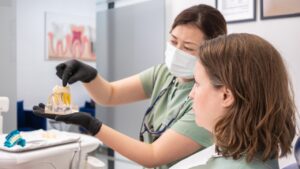Understanding Dental Emergencies
When faced with a dental emergency, grasping the nuances of various types and recognizing the urgency of immediate care is vital. This section sheds light on the common types of dental emergencies and underscores the importance of timely intervention.
Types of Dental Emergencies
Dental emergencies can broadly be divided into traumatic, infectious, and post-procedural categories, each warranting immediate attention to prevent further complications (NCBI).
1. Traumatic Dental Emergencies:
These include tooth fractures, luxations, and avulsions, typically resulting from falls, sports injuries, traffic accidents, or physical violence. Falls are the most prevalent cause, with sports-related injuries common among teenagers, and violence-related trauma increasingly seen in young adults aged 21 to 25 (NCBI).
2. Infectious Dental Emergencies:
These emergencies often originate from dental caries, leading to infections that can escalate into severe, life-threatening conditions such as deep neck infections and osteomyelitis. It’s pivotal to address these infections promptly, as they are responsible for almost 50% of deep neck abscesses and over 90% of Ludwig angina cases (NCBI).
3. Post-Procedural Dental Emergencies:
These emergencies arise post dental treatments and can include issues like infections or complications following procedures such as tooth extractions or root canals.
Below is a quick reference table summarizing common dental emergencies and their causes:
| Emergency Type | Common Causes | Typical Symptoms |
|---|---|---|
| Traumatic | Falls, sports injuries, traffic accidents, violence | Tooth fractures, luxations, avulsions |
| Infectious | Dental caries, oral infections | Severe pain, swelling, deep neck infections |
| Post-Procedural | Complications from treatments | Infections, excessive bleeding |
Importance of Immediate Attention
Seeking prompt care for dental emergencies is essential to avoid exacerbating the issue and encountering further complications. Pain from dental emergencies, if left untreated, can lead to severe conditions affecting contiguous structures in the neck and sinuses, and may even compromise the airway.
Why Immediate Care Matters:
- Preventing Severe Complications: Conditions like Ludwig angina and deep neck abscesses can arise from untreated infections.
- Managing Pain: Untreated pain can intensify, making it crucial to address symptoms promptly. See our article on managing dental pain until you can see a dentist for more details.
- Maintaining Oral Health: Immediate care helps restore oral health, preventing long-term issues.
For a comprehensive list of emergencies, visit our page on common dental emergencies we treat same-day.
Taking the right steps during a dental emergency can make a significant difference in the outcome and ensure your oral health is preserved. For more on how to respond in these situations, see our section on steps during a dental emergency.
Steps During a Dental Emergency
Dental emergencies can strike unexpectedly, but knowing the appropriate steps to take can make a crucial difference. Understanding what to do if you need same-day emergency dental care is essential for preserving your oral health.
Stay Calm and Assess
When faced with a dental emergency, the first step is to stay calm and assess the situation. Panicking can make it harder to take effective action and can worsen the condition. Start by examining the affected area to understand the severity of the problem. Look for signs of bleeding, swelling, or dislodged teeth. This initial assessment will help you determine the next steps and communicate the issue accurately when you contact an emergency dentist (Washington Family Dental).
Handling Specific Situations
Different dental emergencies require specific actions. Here are some common scenarios and the recommended steps for each:
Broken or Chipped Tooth
- Rinse your mouth gently with warm water to clean the area.
- Save any broken pieces of the tooth.
- Apply a cold compress to the outside of your mouth to reduce swelling.
- Avoid using the affected tooth for chewing.
- Contact an emergency dentist immediately for further instructions (how to handle a broken tooth before your dental visit).
Knocked-Out Tooth
- Retrieve the tooth by the crown (the top part), avoiding touching the root.
- Rinse the tooth gently with water if it’s dirty, but do not scrub or remove any tissue fragments.
- Try to place the tooth back into its socket if possible, but do not force it.
- If reinsertion is not possible, store the tooth in a container of milk or a saline solution.
- Seek emergency dental care promptly, as the chance of saving the tooth decreases significantly after 30 minutes (Emergency Dental of Columbus).
Severe Toothache
- Rinse your mouth with warm water to clean the area.
- Use dental floss to remove any food particles around the tooth.
- Avoid placing aspirin directly on the gum or tooth, as it can burn the tissue.
- Use over-the-counter pain relievers to manage discomfort.
- Apply a cold compress outside the affected area to reduce swelling.
- Contact an emergency dentist as soon as possible to identify the cause and receive appropriate treatment (managing dental pain until you can see a dentist).
Contacting Emergency Dentist
After assessing the situation and taking immediate action, the next crucial step is to contact an emergency dentist. Prompt action is essential to prevent further complications or infections.
- Call your regular dentist; many dental practices have after-hours services or emergency contact information.
- If you cannot reach your dentist, use online resources or local directories to find nearby emergency dental clinics. It’s beneficial to be aware of the benefits of choosing a local emergency dental clinic.
- Explain your situation clearly, including the steps you’ve already taken and any symptoms you’re experiencing.
| Emergency Service | Contact Information |
|---|---|
| Baltimore Emergency Dental | (123) 456-7890 |
| Local Emergency Clinic | (098) 765-4321 |
| 24/7 Dental Hotline | 1-800-DENTIST |
Following these steps during a dental emergency can significantly improve the outcome and minimize damage. For further assistance and resources, explore our articles on common dental emergencies we treat same-day and emergency tooth infections: symptoms and treatment options. Stay prepared and informed to keep your smile healthy and intact.
Prompt Action for Dental Emergencies
Immediate action during a dental crisis can mean the difference between saving and losing a tooth. Understanding what to do if you need same-day emergency dental care is vital in preventing further damage and ensuring effective treatment.
Treatment Procedures
When dealing with dental emergencies, several procedures are commonly employed to address various issues:
- Dental Emergency Exams: Crucial for assessing damage, identifying the cause of the problem, alleviating discomfort, and restoring oral health promptly (Parker Dental).
- Emergency Tooth Extraction: Necessary for severely infected or damaged teeth that cannot be saved.
- Tooth Filling and Root Canal: For cavities and infections reaching the tooth pulp.
- Broken Tooth Repair: Using bonding, crowns, or veneers to restore tooth structure.
- Management of Broken Dentures: Repairing or replacing damaged dentures to restore functionality.
| Emergency Procedure | Purpose |
|---|---|
| Dental Emergency Exam | Assess damage, alleviate discomfort |
| Emergency Tooth Extraction | Remove severely infected/damaged teeth |
| Tooth Filling & Root Canal | Treat cavities and pulp infections |
| Broken Tooth Repair | Restore structure |
| Broken Dentures | Fix or replace damaged dentures |
For more common treatments we provide, see common dental emergencies we treat same-day.
Preventing Further Complications
Addressing dental emergencies promptly is critical to prevent complications that could arise from delayed treatment. Here are steps to mitigate further issues:
1. Immediate action: Seek emergency care if symptoms like pain and swelling are present. This often indicates an urgent need for professional attention (Absolute Dental).
2. Handling Specific Situations:
- Toothaches: Rinse your mouth with warm water, use dental floss to remove any lodged food particles, and avoid placing aspirin near the aching tooth.
- Broken Tooth: Rinse mouth with warm water, save any broken pieces, and apply gauze to any bleeding areas. Refer to how to handle a broken tooth before your dental visit for detailed guidelines.
- Knocked-Out Tooth: Keep the tooth moist by placing it in milk or a tooth preservation product and seek immediate dental attention.
3. Immediate Dental Care: Procedures you might undergo include emergency tooth extraction, infection treatment, and handling broken teeth or dentures.
4. Dental Hygiene: Continuous oral hygiene practices can significantly reduce the risk of emergencies. Regular brushing, flossing, and professional cleanings are indispensable. Learn more about effective methods managing dental pain until you can see a dentist.
5. Preventative Measures: Wearing protective gear like mouthguards during sports, and avoiding hard foods that might crack teeth are effective preventive steps (Care For Smiles).
To understand more about emergency situations and when to seek immediate care, see our section on signs you need emergency dental care right away. For additional ways to reduce complications and ensure rapid recovery, contact our emergency dentists.
Dental Emergency Services
When faced with a dental emergency, it’s important to understand the services available to address your immediate needs. Baltimore Emergency Dental provides comprehensive care to ensure you receive prompt and effective treatment.
Assessing Dental Needs
Assessment is the first step in any dental emergency. Evaluating symptoms is critical to determine the severity of the issue and the appropriate course of action. Common dental emergencies treated by the Parker Dental team include toothaches, broken teeth, knocked-out teeth, chipped teeth, and lost fillings or crowns (Parker Dental).
For a more detailed guide on assessing dental emergencies, consider reading our article on signs you need emergency dental care right away.
Emergency Dental Treatments
Baltimore Emergency Dental offers a range of treatments tailored to address urgent needs. These services aim to alleviate pain, prevent further damage, and restore oral health.
Common Treatments
| Treatment | Description |
|---|---|
| Dental Infection Care | Treatment for abscesses and infections to prevent spread and alleviate pain. |
| Emergency Tooth Extraction | Removal of severely damaged or infected teeth to avoid complications. |
| Tooth Filling | Repair of cavities or cracks to restore the tooth’s structure and function. |
| Broken Tooth Repair | Restoration of broken or fractured teeth through various techniques such as bonding or crowns. |
| Denture Repair | Fixing or replacing broken or damaged dentures for immediate functionality. |
| Swollen Gums Treatment | Addressing causes of gum swelling and pain to provide relief (Aspen Dental). |
| Sinus Pressure Relief | Managing gum pain due to sinus issues to improve comfort. |
For more information on managing specific dental issues, you can explore our articles on managing dental pain until you can see a dentist and how emergency dentists treat tooth pain fast.
Specialized Treatments
| Treatment | Description |
|---|---|
| Root Canals | Procedure to save and repair infected or decayed teeth. |
| Crown Placement | Application of crowns to protect and strengthen weakened teeth. |
| Wisdom Teeth Evaluation | Assessment and potential removal of problematic third molars to prevent future issues. |
| Third Molar Treatment | Advanced care for complex cases involving wisdom teeth. |
| Trauma Care | Immediate attention for trauma or injuries to the mouth to mitigate severe consequences (Aspen Dental). |
It’s crucial to act promptly to prevent complications from dental emergencies. For more tips on handling dental issues, visit our article on how to handle a broken tooth before your dental visit. Also, learn about emergency tooth infections: symptoms and treatment options.
Baltimore Emergency Dental is committed to providing comprehensive emergency care, ensuring that patients receive timely and effective treatments to preserve their oral health. For more details on our emergency services, read about the common dental emergencies we treat same-day and the benefits of choosing a local emergency dental clinic.
Costs of Emergency Dental Care
Typical Treatment Costs
Understanding potential costs for emergency dental care can help you plan and manage your finances during a dental emergency. We have compiled a brief overview of common emergency dental procedures and their associated costs.
Various sources (Elmwood Park Dental, Aspen Dental, Murphy Dental) indicate that these costs can fluctuate based on the complexity of the procedure and the dentist’s expertise. It’s important to take into consideration these estimates when planning for emergency care.
Factors Affecting Pricing
Several factors can impact the cost of emergency dental care, including:
- Geographical Location: Prices can vary significantly across different regions and cities. Urban areas may have higher costs compared to rural locations.
- Complexity of Procedure: More complex procedures often require more time, expertise, and specialized equipment, thereby increasing the cost. For instance, a simple tooth extraction will cost less compared to a surgical extraction for an impacted wisdom tooth.
- Insurance Coverage: Dental insurance can greatly affect out-of-pocket expenses. Typically, dental insurance covers a portion of emergency procedures, but it’s essential to check with your provider for specific coverage details. Unfortunately, Aspen Dental does not accept Medicaid, though they provide flexible payment options.
- Dental Practice Policies: Different dental practices may have varying fee structures. Practices like Aspen Dental offer flexible payment options for patients without insurance, ensuring that emergency dental care remains accessible and affordable.
- For more information on managing dental pain until you can see a dentist, check out our guide on managing dental pain until you can see a dentist. Understanding the financial aspect of emergency dental care allows you to be better prepared and make informed decisions during a dental crisis.
Preventing Dental Emergencies
Importance of Oral Hygiene
Maintaining optimal oral hygiene is crucial in preventing dental emergencies. Regular brushing, flossing, and routine dental check-ups play a significant role in keeping your teeth and gums healthy. Without proper care, dental issues like cavities, gum disease, and infections can escalate into emergency situations (Care For Smiles).
Here’s a simple table to demonstrate key components of oral hygiene:
| Hygiene Practice | Frequency |
|---|---|
| Brushing | Twice daily |
| Flossing | Once daily |
| Dental Check-ups | Every 6 months |
Addressing dental issues early can save on future emergency dental care costs and prevent severe pain and complications. For more information on managing dental issues, visit our page on managing dental pain until you can see a dentist.
Preventive Measures
Taking specific preventive measures can help reduce the risk of dental emergencies. These measures include:
- Protective Mouthguards: Wearing mouthguards during sports can prevent injuries like broken or knocked-out teeth.
- Avoiding Hard Foods: Hard foods such as candy, nuts, and ice can crack or break teeth.
- Refraining from Using Teeth as Tools: Using teeth to open packages or bottles can lead to damage.
In addition, educating yourself on potential risks and preventive actions is critical. For instance, understanding how to handle a broken tooth before your dental visit can mitigate further damage. Explore our article on how to handle a broken tooth before your dental visit for more tips.
Visiting a local emergency dental clinic can provide additional benefits for quick and efficient treatment. Discover the benefits of choosing a local emergency dental clinic to learn why nearby care may be a better option. For same-day care needs, also consider reading about same-day emergency care for kids and teens.
By adopting these preventive measures and maintaining good oral hygiene, we can significantly reduce the likelihood of needing same-day emergency dental care.








